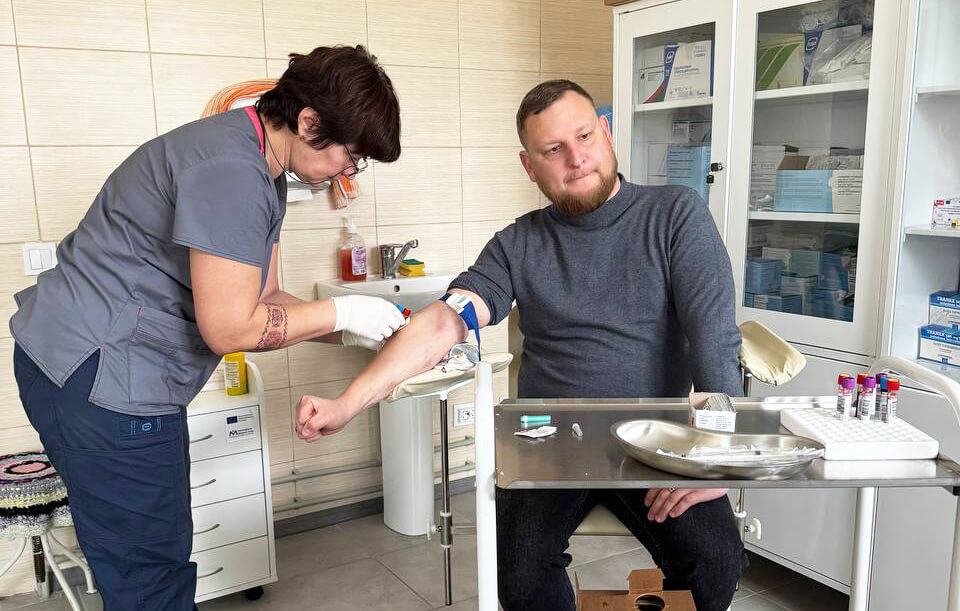Before the Russian invasion in February 2022, the rural village of Oskil, in eastern Ukraine, was a peaceful community filled with multi-generational families who could easily access healthcare. Early in the war, Russian forces occupied the region, damaging or destroying homes, schools and healthcare facilities. Though the village has since been liberated, local health clinics have struggled to rebuild—and one of the biggest challenges has been re-establishing laboratory services.
“When conflict erupts, what was considered a manageable disease can become life-threatening without access to reliable tests and medication,” explains Dr. Jill John-Kall, Senior Global Health Advisor at International Medical Corps. “Laboratory services are essential to effective diagnoses and treatment of countless health issues, including chronic conditions like diabetes and kidney disease.”
To address this critical issue, International Medical Corps established a fully functional mobile laboratory service that travels to three local clinics—Oskil Ambulatory, Studenok Ambulatory and Kapitolivka Ambulatory—bringing critical diagnostic services back to the area for the first time since the war began.
Before we provided this service, patients in need of urgent diagnostics had to travel more than 30 kilometres (approximately 19 miles) to the nearest functional laboratory facility—a journey that was often dangerous, costly and, for the elderly and critically ill, nearly impossible. Without timely lab tests, doctors were forced to make critical medical decisions without accurate data, risking lives.
“This isn’t just a lab—it’s a lifeline,” explains Dr. Svitlana Sumets, head of one of the clinics. “For the first time in years, we can provide real answers to our patients without sending them on dangerous, long journeys to another city.”


The laboratory service is designed to be flexible, fast and highly efficient, adapting to each community’s needs. This approach eliminates barriers to access and ensures that even the most vulnerable people receive timely medical evaluations.
The laboratory service provides a range of essential tests, including:
- blood analysis to detect infections, anemia and chronic diseases;
- glucose and cholesterol tests for diabetes and cardiovascular monitoring;
- liver- and kidney-function tests to diagnose organ-related diseases;
- cancer screening tests;
- blood tests to monitor thyroid function and determine thyroid hormone levels; and
- determination of electrolyte metabolism indicators.
The project was not just about conducting laboratory testing—it was about restoring confidence in local healthcare. For months, medical professionals had struggled to provide adequate care. With the launch of our laboratory service, they now have the tools to diagnose and treat illnesses more effectively.
One of the most significant benefits has been the early detection of chronic conditions. Many people in these areas suffer from undiagnosed hypertension, diabetes and kidney disease, which can lead to severe complications if left untreated. The laboratory service detects these conditions earlier, enabling timely medical interventions and better long-term health outcomes.
“Before, we had to send patients to regional hospitals, which could take hours or even days due to transportation issues,” explains Nataliia Hluhodid, a nurse in Oskil. “Now, we can conduct essential tests here, providing faster diagnoses and better care.”
The success of the laboratory service highlights the need for innovative healthcare solutions in conflict-affected and remote areas. By leveraging technology and a patient-centred approach, International Medical Corps’ laboratory service has transformed healthcare access for many people, offering hope and essential care where it is needed most.
As conflict and displacement continue to affect rural communities in Ukraine, we remain dedicated to ensuring that healthcare remains accessible, lifesaving and sustainable—no matter the circumstances.
Learn more about our work in Ukraine, and donate to International Medical Corps todayto help people around the world affected by conflict, disaster and disease.
